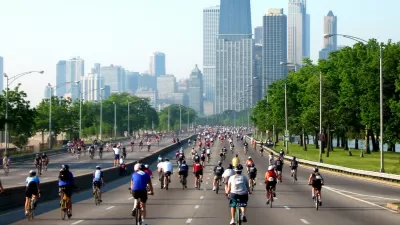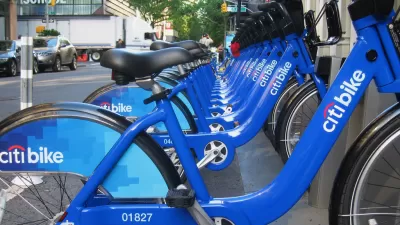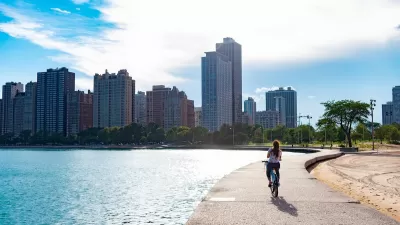Last week Chicago became the envy of America's urban biking advocates when it opened the city's first two-way protected bike lanes in the heart of the Loop, reports Lori Rotenberk.

Along 12 blocks of Dearborn Street in the heart of the city's central business district, Mayor Rahm Emanuel's and transportation Commissioner Gabe Klein's plan to turn Chicago into the "bike friendliest city in the country" took a giant leap forward last week.
Created at a cost of $450,000, the two-way protected bike lane that was created by removing a car lane features bike traffic signals, signs instructing pedestrians to "look both ways," and a 3-foot wide buffer between the bike lanes and the adjacent parking lane, reports . As Rotenberk explains, "[t]he major goals of the redesign include slowing down the approximately 13,100 vehicles a day that use the 1.15-mile Dearborn corridor and enhancing pedestrian safety, yet also improving traffic flow, said Commissioner Klein, who often bikes to work."
"Michael Amsden, a project manager for the Chicago Department of Transportation (CDOT) Bike Program says swiping a lane from drivers took 'lots of political know-how,' adding that 'no other city has cut through dense traffic' in that manner. While other cities have been putting in bike infrastructure for years, what sets Chicago apart, Amsden says, is the sheer super-speed at which the city has laid down protected bike lanes, going from 'zero to second-most in the country in just 18 months.' City officials hint that converting car lanes into bike lanes is the way of Chicago’s future," writes Rotenberk.
As Angie Schmitt notes at Streetsblog, bike advocates across the country are now looking to the Windy City with admiration and envy. In America's expanding bicycle infrastructure game of one-upmanship, Chicago has just raised the ante.
FULL STORY: Chicago likes bikes — and it’s about to prove it in a big way

Planetizen Federal Action Tracker
A weekly monitor of how Trump’s orders and actions are impacting planners and planning in America.

San Francisco's School District Spent $105M To Build Affordable Housing for Teachers — And That's Just the Beginning
SFUSD joins a growing list of school districts using their land holdings to address housing affordability challenges faced by their own employees.

The Tiny, Adorable $7,000 Car Turning Japan Onto EVs
The single seat Mibot charges from a regular plug as quickly as an iPad, and is about half the price of an average EV.

Seattle's Plan for Adopting Driverless Cars
Equity, safety, accessibility and affordability are front of mind as the city prepares for robotaxis and other autonomous vehicles.

As Trump Phases Out FEMA, Is It Time to Flee the Floodplains?
With less federal funding available for disaster relief efforts, the need to relocate at-risk communities is more urgent than ever.

With Protected Lanes, 460% More People Commute by Bike
For those needing more ammo, more data proving what we already knew is here.
Urban Design for Planners 1: Software Tools
This six-course series explores essential urban design concepts using open source software and equips planners with the tools they need to participate fully in the urban design process.
Planning for Universal Design
Learn the tools for implementing Universal Design in planning regulations.
Smith Gee Studio
City of Charlotte
City of Camden Redevelopment Agency
City of Astoria
Transportation Research & Education Center (TREC) at Portland State University
US High Speed Rail Association
City of Camden Redevelopment Agency
Municipality of Princeton (NJ)




























